I’m very pleased that Dr. Heidi Hammel agreed to a print interview about this book! I’ve long believed in the power of books, especially for young minds. My childhood home didn’t have children’s books but I recently read A Wrinkle in Time for the first time. Dr. Hammel’s experience makes me wish I’d had it as a child!
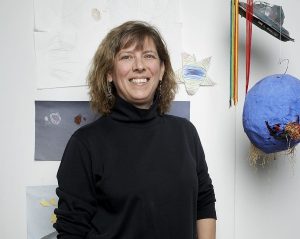
HH: On my tenth birthday, in 1970, my 11-year-old brother gave me a copy of A Wrinkle in Time. This was the scholastic paperback edition, blue with series of concentric rings around three small characters.
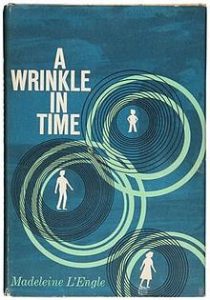
VL: What was going on in your life at the time?
HH: I was just a kid, a young girl specifically, at a time when girls did just girl things. Sugar and spice and everything nice. Glass ceilings everywhere. Invisible glass ceilings—most girls didn’t even THINK of doing things other than being a wife, a nurse, or a teacher. Maybe a daring girl could be a flight attendant or a secretary. But no real girls did science or space research or math. (Madame Curie was a unicorn, a historic anomaly, not a real regular person.)
VL: I can absolutely identify with that. I read the Cherry Ames series about the adventures of a nurse. Although she was a great role model in many ways—daring and caring and a problem solver—in high school I wanted to become a surgeon. Although I was valedictorian of my class, I was counseled to become a nurse instead—albeit with a B.S. degree so I could move up in administration. I do admire your determination! But tell me, in what way(s) did the book affect you?
HH: The book blew my mind. Here was a girl like me – her physical description was mine, from the limp non-descript hair to the glasses and teeth that would need braces; her school life was like mine – interested in things that other girls were not like atomic particles and space, and not really accepted as “popular.” Yet, for all her faults – indeed, specifically BECAUSE of her faults – she completed a hero’s journey. What an eye-opener. What a LIFE opener. A literal literary role model. If an ordinary girl like Meg could find her father across all of space and time, then all things were possible for me. When, years later, a special teacher suggested I apply to MIT for college, I had a “WWMD” (what would Meg do) moment, and said “sure!” The rest is history, as they say.
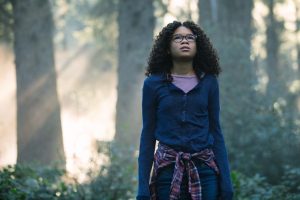
HH: I’ve reread A Wrinkle in Time many times over the years. During my high-school years, as an undergraduate at MIT, while in graduate school for physics, as a young mother, and even now. I reread books I love, because the stories ring true, and because I sense different overtones based on who I am and what I have experienced in my own life. Things that may not have registered to me as a 10-yr-old, or 30-yr-old, or a 50-yr-old take on new meaning when viewed through the lenses of varied experience.
VL: So true! In my younger years, when my primary escapist reading was murder mysteries, I never reread them. Once you know “who done it,” what’s the point? The exception back then was Jane Austen, whom I discovered in college and have reread many times since. Now, since I started writing them, I seldom read mysteries. My escapist reading goes in all sorts of directions and I reread often! I also tend to give books I love to others. Have you ever given A Wrinkle in Time to others? If so, who and why?
HH: I gave this book as gifts to friends as a young girl, especially those friends who I thought might share in the vision of what young women could be and could do.
I read it aloud to my own children, so they could travel through the tesseract with me to worlds so different from – yet so like – our home planet.
VL: What other books by Madeleine L’Engle have you read?
HH: I’ve read all of her books. The complete Kairos and Chronos series, as well as her books for adults. I admit to enjoying the “young adult” books more than the books specifically for adults.
![[Source: BellaOnBooks]](http://vivianlawry.com/wordpress/wp-content/uploads/2018/03/Madeleine-L’Engle-books-300x166.gif)
HH: I think the only other book that comes close to having a visceral impact on me would be Ray Bradbury’s The Martian Chronicles. In this book, Bradbury paints a tapestry of human exploration on Mars through a series of short stories that are as much poetry as science fiction. The stories are deeply human emotional stories, but told from the perspective of Martian natives. It was brain-bending in an orthogonal way to A Wrinkle in Time but nearly as powerful and evocative.
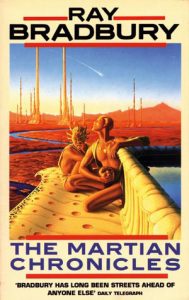
HH: My hope is that each generation of girls and boys have Madeleine L’Engle’s books placed in their hands at a young age.
VL: I join you in that hope! And thank you again for sharing your experience with and thoughts about this powerful book.
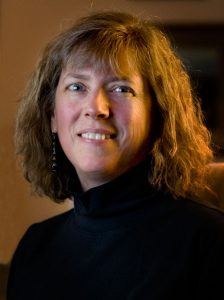
Stay tuned for our #WrinkleReRead giveaway of A Wrinkle in Time by Madeleine L’Engle and Becoming Madeleine, a biography of the life and works of Madeleine L’Engle written by her granddaughters.
I really appreciate the free books you offer, but I just don”t understand why you include horror with fantasy & sci-fi. Both of the latter genres are escapist by nature, but horror most definitely IS NOT. I know it”s tough to find a genre that is more associated with it, but what about with suspense/thrillers, action, or mystery? To me, at least, those seem to be more appropriate. JMHO. Thanks!
I’m not sure what horror you mean. Please let me know.